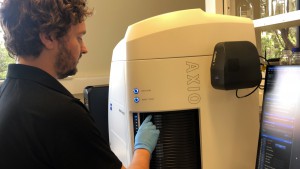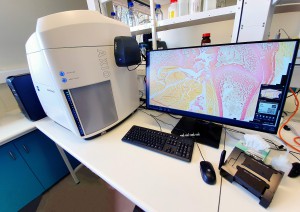The highly anticipated commissioning of a $1.2 million super-rapid speed confocal microscopy suite at the Curtin Health Innovation Research Institute (CHIRI) is a step closer this week with the slide scanner component of the technology now installed (watch a short video here).
Funded principally through the Australian Research Council’s (ARC) Linkage Infrastructure, Equipment and Facilities (LIEF) 2020 scheme, the Zeiss Axioscan.Z1 slide scanner will soon to be joined by an Andor Dragonfly 502 Confocal Microscope to establish Western Australia’s only super-rapid speed, high-throughput confocal microscopy facility.
CHIRI Director Professor John Mamo said these high-tech additions to CHIRI’s research facilities would return WA rapid acquisition fluorescent microscopy to the cutting edge.
“It’s an exciting time for both our institute and the wider WA research community, as we mark the penultimate step in establishing what will be the best super-rapid speed confocal microscopy suite in the state at Curtin-CHIRI,” Professor Mamo said.
“The super-rapid speed confocal microscope will provide WA researchers with contemporary state-of-art opportunities to analyse living cells and large-area tissue specimens in three-dimensions with the highest possible speed and high-resolution. The slide scanner digitises microscopy slides for viewing, managing and electronic storage, and helps scientists generate data for image analysis.”

CHIRI Senior Technical Officer (Microscopy and Histology) Michael Nesbit demos the new slide scanner.
While CHIRI’s research team will use the technology to boost its research focused on finding new preventions and treatments for chronic diseases with ageing, the shared use facilities will also be accessible to other WA researchers, including in the life-science areas of biotechnology, medicine, environmental biology and agriculture.
CHIRI’s application for LIEF funding was supported by 63 WA-based leading researchers involved in international and national research collaborations and studying a range of biological systems.
WA currently hosts just one 12-year-old rapid-acquisition confocal microscope, which while heavily used is no longer manufactured and prone to regular, prolonged and costly breakdowns.
Professor Mamo said CHIRI’s soon to be realised super-rapid speed confocal microscopy facility would provide WA researchers with access to similar technologies to their counterparts in Queensland, NSW, Victoria, Tasmania or South Australia.
“WA scientists make significant contributions to national life-science research priorities in agriculture, health and environmental science but when it comes to having access to these types of facilities have been at a significant disadvantage for several years,” Professor Mamo said.
“CHIRI’s new super-rapid speed confocal microscopy suite will address this disadvantage and ensure WA can retain its well-earned reputation for research excellence across a range of life-science related disciplines.”
More information on CHIRI’s shared-use facilities is at https://chiri.curtin.edu.au/facilities/.
